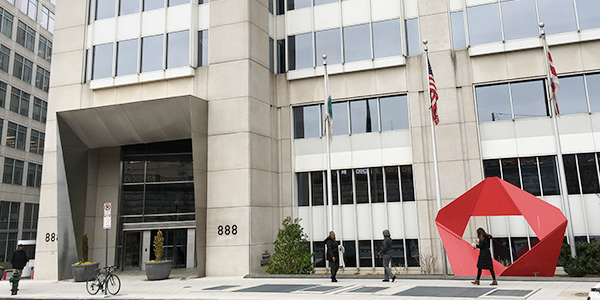By Rich Heidorn Jr.
FERC Chairman Neil Chatterjee said Thursday the agency is relaxing some filing deadlines and deferring some enforcement activities in response to the COVID-19 coronavirus pandemic, but that commission staff are working remotely to continue responding to industry filings.
“This commission will not be in the business of second guessing the good faith actions that companies take to keep the lights on,” Chatterjee said at a news conference via phone after the commission canceled its March open meeting. “I’m committed to ensuring that the industry can focus on continuity, safety and stability — not regulatory or enforcement matters that are not mission-critical during this crisis.”
The commission announced that:
- It has issued a notice extending the deadlines for certain filings that are due on or before May 1, 2020 (AD20-11). Included in the extension are filings required by entities’ tariffs or rate schedules and non-statutory filings required by the commission such as compliance filings, responses to deficiency letters and rulemaking comments. Deadlines for certain forms required by the commission also have been relaxed, except for FERC Form 6, the annual report of oil pipelines. The notice also indicates that entities may seek extensions for other deadlines and waivers of commission orders, regulations, tariffs and rate schedules.
- FERC’s Office of Enforcement is postponing all previously scheduled audit site visits and investigative testimony. The office also will consider extensions and waivers of compliance filings, forms and electronic quarterly reports.
- Technical conferences scheduled through May 2020 will be postponed or conducted via conference call or WebEx. Schedules will be posted to the FERC.gov calendar.
- Chief Administrative Law Judge (ALJ) Carmen Cintron has postponed a hearing scheduled to start April 7 and will make case-specific calls on other hearings as their start dates approach. ALJ settlement conferences will continue via conference call.
- Chatterjee has tapped Caroline Wozniak, senior policy adviser in the Office of Energy Market Regulation, as the commission’s point of contact for all industry inquiries on the impact of its COVID-19 response. Questions can be sent to PandemicLiaison@ferc.gov.
Chatterjee said the commission is working with the Department of Energy, Department of Homeland Security and the Centers for Disease Control and Prevention to address coronavirus impacts affecting energy infrastructure. It also is working with NERC’s Electricity Information Sharing and Analysis Center to provide recommendations to industry to help with business continuity planning.
The steps announced Thursday followed a joint pledge by FERC and NERC Wednesday to use “regulatory discretion” to address the difficulties registered entities may have with complying with reliability standards. (See FERC, NERC Relax Compliance in Light of COVID-19.)
Most commission employees are on telework status until further notice and headquarters will remain closed to outside visitors unless they are cleared by the Office of the Executive Director.
Although the commission canceled Thursday’s open meeting, it said it would issue all the orders listed on the meeting agenda through notational voting.
Chatterjee said the commission’s telework capabilities should enable it to continue to perform its duties.
“I think that one of the reasons we wanted to hold this teleconference and vote on all of the orders that were on the [agenda] notationally today was to demonstrate that the commission is fully functioning,” he said.
Commissioner Richard Glick suggested in a statement that the commission should delay issuing nonessential orders because it has no authority to waive the 30-day deadline for parties to seek rehearing on commission orders. “To the extent commission action is not statutorily required or needed in the short-term, I believe we should refrain from acting to allow parties who are otherwise dealing with the pandemic to avoid putting resources toward seeking rehearing of a commission order,” he said.
Chatterjee said that would be unfair to parties who have been waiting for commission action.
“The industry continues to work to provide Americans with energy. The commission has to continue to respond to their filings. Many of the commission’s actions are increasing regulatory certainty to stakeholders. We’re not imposing additional burdens. … The energy bar should largely be able to telework as is most of the commission.
“Of course, we’ll be flexible and evaluate all of our actions on a case-by-case basis,” he added. “But I think FERC pausing action right now would not be good for the economy. The last thing industry needs right now is delays.”
Jordan Cove, Danly
Among the items on which the commission acted Thursday was voting 2-1 to approve the Jordan Cove LNG export facility, with Glick dissenting (CP17-495, CP17-494). A vote on the project was postponed at the last minute at the commission’s February meeting. (See In Rare Surprise, FERC Declines to Act on Jordan Cove.)
Chatterjee said he was deferring to General Counsel James Danly on when he would be sworn in as FERC’s fourth commissioner. Danly was confirmed by the Senate on March 12. (See Senate Confirms Danly to FERC.)
“Until he makes that announcement, he is still general counsel,” Chatterjee said, declining to say who would be Danly’s replacement as the commission’s top lawyer.
Chatterjee rejected complaints by Democrats on the Senate Energy and Natural Resources Committee earlier this month that the commission had become politicized. Democrats were incensed that Republicans advanced Danly without taking action on their candidate for a Democratic opening on the five-member commission. (See Danly Re-advances, but not Without Drama.)
Danly, Chatterjee and Commissioner Bernard McNamee will form a 3-1 majority, with Glick the lone Democrat.
“The overwhelming majority of the work we do is by consensus. It shouldn’t matter what political party there is,” Chatterjee said. “I do not recall similar criticism of the commission when it was 3-0 Democrat for a considerable period of time.”






